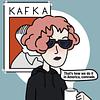Take a photo of a barcode or cover
emotional
reflective
medium-paced
This was a moving piece about moving through life and soaking up everything possible while also pointing out that we will never be able to do that and eventually everything we know will rot and disappear.
I just read this only to come to goodreads and finding out I've already read this book and it didn't even seem familiar at all, which I guess tells you something.
emotional
informative
reflective
medium-paced
There is a lot of beauty and interesting ideas in this book. I don't know if it was my headspace , or my expectations, but I never felt like this book landed for me. When I started, I thought, oh, this is gonna warrant a reread, but it never went as deep as I felt it may, until the very lovely end. But that was t enough for me to feel moved, partially because I was often annoyed at her for not (publicly) examining her own behavior. Ultimately, only average level of enjoyment for my graphic novel loving mind.
emotional
reflective
relaxing
fast-paced
Contemplative.
An interesting meditation on health, disease, relationship to objects/people/places, ruin, and loss. It's all quite interesting to a point, but then it just kind of ends without ever really saying anything.
Radtke puts these ideas next to each other and asks questions about them, and you feel the emptiness in it all, but she leaves it there. With the emptiness. Which is fine, really, but I'm sort of left with a single burning question:
Why does this book exist?
Part of this probably isn't the book's fault. I don't know why I keep reading memoir graphic novels since I seem to like none of them. Probably I picked this one up because of rave reviews and the fact that our last names are almost the same, but I didn't really get much from this.
Which is a bit surprising because she lingers on things that fascinate me, like emptiness and ruin and loss, but she seems to not really have anything to say about any of them beyond that they exist.
Which is why I wonder why she bothered writing this at all.
It's a question I find myself asking more and more of the novels I read: why did this person write this? Why does this exist?
Far too often, the answer seems--to me--to be that there's no reason for the novel to exist, and yet here it is, existing.
Anyrate, it's not bad and only takes about an hour or so to read. You may really enjoy it, especially if you enjoy memoirs.
Radtke puts these ideas next to each other and asks questions about them, and you feel the emptiness in it all, but she leaves it there. With the emptiness. Which is fine, really, but I'm sort of left with a single burning question:
Why does this book exist?
Part of this probably isn't the book's fault. I don't know why I keep reading memoir graphic novels since I seem to like none of them. Probably I picked this one up because of rave reviews and the fact that our last names are almost the same, but I didn't really get much from this.
Which is a bit surprising because she lingers on things that fascinate me, like emptiness and ruin and loss, but she seems to not really have anything to say about any of them beyond that they exist.
Which is why I wonder why she bothered writing this at all.
It's a question I find myself asking more and more of the novels I read: why did this person write this? Why does this exist?
Far too often, the answer seems--to me--to be that there's no reason for the novel to exist, and yet here it is, existing.
Anyrate, it's not bad and only takes about an hour or so to read. You may really enjoy it, especially if you enjoy memoirs.
A really mixed bag here. Imagine Wanting Only This is a bit self-indulgent for my tastes and definitely at it's best when Radtke pulls the focus out from herself. (I would happily read an entire book about Peshtigo, in particular.) Otherwise it was a kind of generic, privileged ennui that I can relate to but didn't find especially compelling here, and the book's purported themes never seemed to come together. I would read more from this author but only if it was more on the journalistic than the memoir side of nonfiction.
Radtke wrote a deeply motivated piece about grief and loss but at the same time didn't - she was able to portray loss all around her but we don't really see it from her perspective. We only see the loss and decay of towns, cities and even the lives of other people. The story was beautiful but definitely leaves something to be desired.
challenging
dark
reflective
sad
medium-paced








